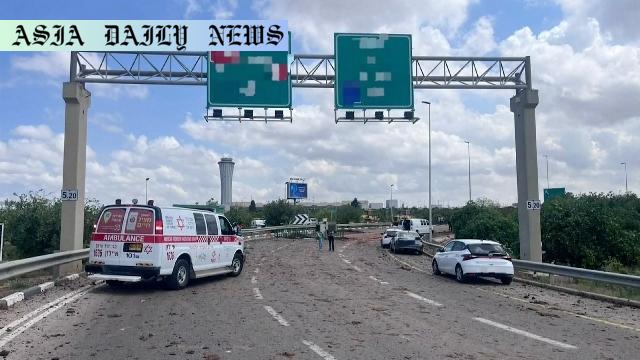Missile Attack: A Houthi missile struck near Israel’s Ben Gurion Airport, causing injuries, suspending flights, and escalating tensions.
Houthi missile lands near Israel’s Ben Gurion Airport.
Six individuals reportedly injured, flights briefly suspended.
Houthi rebels warn airlines against using the airport.
Tensions escalate as Israeli forces confront Hamas in Gaza.

Houthi Missile Strike Near Israel’s Ben Gurion Airport
A Houthi missile fired from Yemen landed in close proximity to Israel’s primary international gateway, Ben Gurion Airport. This attack, claimed by the Iranian-backed Houthis, underscores mounting tensions in a region already grappling with conflict. The Israeli military attempted to intercept the missile; however, reports indicate it missed the target, leading to the missile impacting nearby and injuring six individuals. The incident compelled authorities to momentarily halt both takeoffs and landings, leaving travelers stranded and uncertain.
With the Houthis declaring their solidarity with Hamas in response to increasing Israeli military actions in Gaza, their latest missile strike appears to be a symbolic show of resistance. The Houthis, known for their significant military capabilities, have repeatedly targeted Israel, with this latest attempt escalating their involvement in the broader regional conflict.
Immediate Aftermath and Security Concerns
The attack has sparked concerns over the vulnerability of regional infrastructure, particularly Ben Gurion Airport, a critical hub for both Israel and the wider Middle East. The airport plays a pivotal role in connecting Israel to the global economy, and any sustained threat to its operations could have significant national and international implications. Following the attack, safety measures have likely been bolstered, with Israeli officials expected to review their security strategies to prevent such occurrences in the future.
Houthi leaders issued a warning to global airlines to avoid utilizing Israeli airspace or airports, signaling potential future missile attacks. This warning marks a new level of provocation by the group, pushing Israel into a situation necessitating prompt diplomatic and military responses. Calm travelers were visibly shaken by the disruption, further illustrating how such attacks extend beyond military targets to strike fear into civilians.
Regional Implications and Escalation Risks
This incident occurs against the backdrop of intense Israeli military campaigns against Hamas in Gaza, making the missile attack a highly charged development. Iranian-backed groups, including Hezbollah and the Houthis, show increasing alignment regarding their opposition to Israeli operations. Such coordination raises fears of a wider regional conflict, drawing in countries like Iran and other actors with vested interests in Middle Eastern geopolitical dynamics.
Beyond its immediate impact, the attack near Ben Gurion signals a potential shift in Houthi military strategy. As a non-state actor employing missile technology to attack far-reaching targets, the group may be seeking to elevate its status among its allies and maintain relevance in the broader anti-Israel narrative propelled by Iran. This growing threat compounds existing regional tensions, indicating further instability might be on the horizon.



Commentary
Heightened Risks of Regional Instability
The recent missile strike near Ben Gurion Airport showcases how interlinked conflicts in the Middle East can expand and intertwine, often drawing unintended targets into the fray. The Houthis’ boldness in targeting a critical piece of Israeli infrastructure reflects their growing capabilities but also highlights the fragility of peace in a region embroiled in centuries of geopolitical tension. The international community must now grapple with how to prevent such actions from escalating further, as the risk of a broader conflict looms larger with every incident of this nature.
What’s particularly troubling about this attack is its timing and choice of target. Striking near Ben Gurion Airport is not merely an operational or tactical decision but a symbolic one meant to disrupt Israel’s connection with the world and, by extension, the world’s perception of Israel’s security. This should concern global powers, as international airports are crucial not just for commerce but for symbolizing national resilience, an asset whose loss can deeply impact public morale.
Call for Strategic Diplomatic Interventions
While Israel has been swift in responding to such attacks with defensive postures and military rhetoric, the necessity for a robust diplomatic push cannot be understated. Allies of both sides must step in to de-escalate tensions and bring some semblance of order to the region. Both short-term and long-term strategies need to be conceived to mitigate the fallout from incidents like these, as they not only disrupt local stability but potentially trigger ripple effects globally.
This missile attack should serve as a wake-up call for nations and alliances worldwide. Beyond condemning the violence, steps must include addressing the root causes of the conflict—which range from historical grievances to territorial disputes and diverging ideological motives. With tensions escalating on all fronts, the need for calm heads, clear strategies, and decisive action is more urgent than ever before.